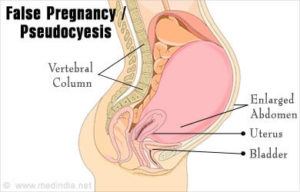A phantom pregnancy happens when a woman believes she’s pregnant and has pregnancy symptoms, but isn’t pregnant. It’s also called a false pregnancy or pseudocyesis. (People once also referred to it as an hysterical pregnancy or fake pregnancy.)
A phantom pregnancy or false pregnancy happens when a woman has pregnancy symptoms but isn’t pregnant. Phantom pregnancy is rare, and experts don’t know exactly what causes it, but it’s probably a combination of psychological and hormonal factors. In a phantom pregnancy, the pregnancy test comes back negative and an ultrasound shows that there’s no baby. A woman who has a false pregnancy will need plenty of support from her caregiver to deal with symptoms, any medical condition causing the phantom pregnancy, and the psychological aftermath.
Phantom pregnancies are rare. Estimates vary but range from 1 to 6 cases per 22,000 births in the United States. False pregnancies were more common in the past, before the widespread use of ultrasounds. Interestingly, they’re more common in cultures where motherhood and fertility are emphasized. In Africa, for example, the rates of phantom pregnancy are estimated at about 1 in 160.
Eighty percent of women who experience a phantom pregnancy are married, and most are between the ages of 20 and 44. It can happen at any age, though, including childhood or in the senior years. A woman can have a phantom pregnancy more than once. It can even (very rarely) happen to men. This is called a sympathetic pregnancy or Couvade syndrome.
No, a false pregnancy and a delusion of pregnancy aren’t the same. With a delusion, women don’t experience symptoms. Women who have a delusion of pregnancy are mentally ill and believe that they’re pregnant, even though they have no symptoms. It’s important for doctors to distinguish between the two because a delusional pregnancy requires different psychiatric treatment than a phantom pregnancy.
We don’t know what causes phantom pregnancy, though experts suggest that both psychological and hormonal factors are at play. (Because it’s such a rare condition, there’s not much data, and studies are largely based on individual case reports.) Basically, the body is tricked into thinking it’s pregnant. An increase in hormones such as estrogen and prolactin lead to pregnancy symptoms.
What causes this diagnsosis?
A psychosomatic condition. Because of intense pressure or desire to be pregnant, a woman’s brain triggers hormonal changes that cause pregnancy symptoms. This may happen when a woman has struggled with infertility or had a miscarriage or loss of an infant, or another traumatic event. It also sometimes happens to women who have an intense fear of pregnancy.
Some experts theorize that abdominal growth, the sensation of feeling fetal movement, and the experience of labor pain may be due to increased activity in the sympathetic nervous system (the body’s “fight or flight” system).
Another medical condition. Sometimes a completely unrelated illness can cause elevated hormonal levels or other physical reactions that lead to pregnancy symptoms. These conditions include ovarian tumors, severe depression, cancer, obesity, and ectopic pregnancy. Even weight gain, constipation, or gas – when paired with psychological factors – can cause abdominal distention that a woman may interpret as pregnancy. In one recent study, more than 16 percent of cases of phantom pregnancy were linked to medical conditions.
Major depressive disorders. Women with severe depression or severe stress may have changes in reproductive hormones. In addition, antipsychotic medications can cause some pregnancy-like symptoms, such as weight gain, loss of menstruation, and breast tenderness.

